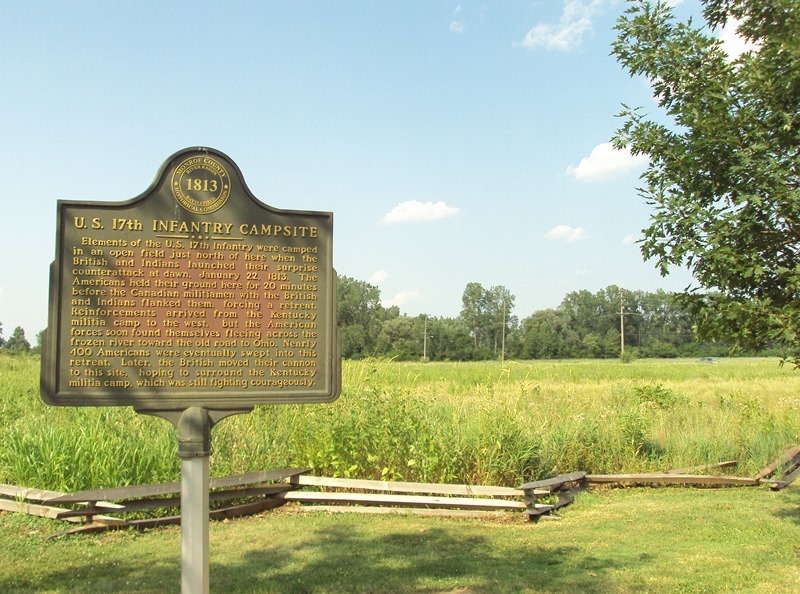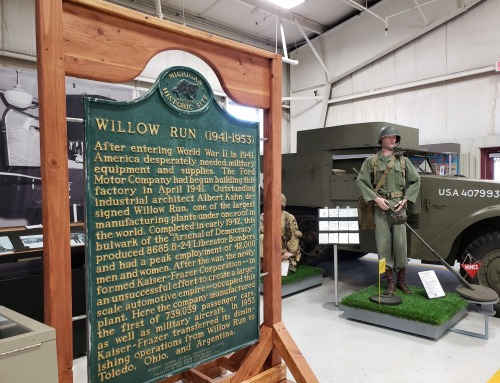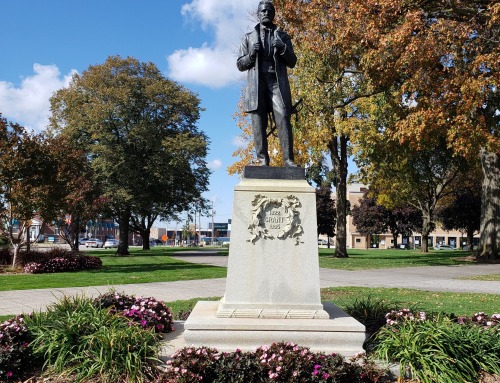As alluded to in last month’s article regarding Mackinac Island, the War of 1812 has more than a few conundrums like being named after one year, and lasting for more than two. The primary reason for the war, impressment of American sailors, ceased to be an issue before the war officially began. Remarkably, the biggest battle occurred after the peace treaty had been signed on December 24, 1814. Unlike other wars in American history, Michigan cities like Detroit and Mackinac Island saw a fair amount of fighting, and not all of it was successful on the part of the Americans. In fact, the bloodiest battle ever fought in Michigan happened on January 22, 1813, so this second part of my War of 1812 article fits quite well.
The Michigan territory, especially Detroit, was unprepared for war with less than 100 regular soldiers and a militia of 700 men who could be counted on in an emergency. In 1811, Governor William Hull traveled to the U.S. capitol to request more of a military presence. He returned from Washington with 1200 additional fighting men and he himself was made a brigadier general of the newly formed North Western Army.
When Hull heard of Congress’s declaration of war, he immediately invaded Canada, yet failed miserably. The British commander at Fort Detroit was well-informed and intercepted Hull’s supplies. Hull and his men had to wait and move canon across the Detroit River, which took time. While this was happening, a different British contingent moved to take Fort Mackinac in northern Michigan and succeeded.
The next engagement in the lower peninsula area of what was yet to be the State of Michigan, was on August 5, 1812. When General Hull heard that Mackinac Island had been lost, he feared that the Native allies of the British would move south to Detroit. These fears intensified when Hull learned that Fort Dearborn in what is now Chicago, had been attacked by Natives and all the soldiers were massacred when they tried to abandon the fort.
Shortly after, in the Battle of Brownstown, the Shawnee chief Tecumseh and his men ambushed a critical supply train south of Detroit. United States Major Thomas Van Horne and 200 US soldiers were moving to the River Raisin, where they were to pick up cattle and other supplies to bring to Fort Detroit. As they forded Brownstown Creek, they were attacked by two-dozen Natives. Though the Americans outnumbered the British and their native allies eight to one, the militia retreated, panicked and scattered. Eighteen Americans were killed, twelve wounded and seventy went missing. The Americans were defeated again.
The first encounter of the War of 1812 that was large enough to be considered a battle was on Michigan soil. On August 9, 1812, British troops, Canadian militia, Tecumseh and his men fought against the larger force of American troops. At the Battle of Maguaga, the Americans were waiting with important supplies for Hull’s army. This was not an American victory, but was not considered a defeat either. The Americans lost eighteen men and 64 others were wounded. After the initial fighting, the Americans camped in a large clearing, nervous to go back into the woods for fear of the Natives attacking. The American commander, Lieutenant Colonel James Miller was in poor health and refused to advance, though Hull repeatedly ordered him to advance toward the rapids of the Detroit River. After two days, Miller remained bivouacked and Hull ordered Miller to return to Detroit. The battle was officially considered a draw. At least we didn’t lose that one, though we probably could have won it if not for Miller being so tentative.
Things got worse after that. The British general Isaac Brock sailed from Niagara to reinforce Fort Malden in what is now Ontario, right on the Detroit River south of the city. With all of the military failures in the Michigan territory, Hull abandoned his plan of invading Canada and moved to take up defensive positions at Detroit. On August 13, he ordered an attack to regain the supplies that had been taken by Tecumseh at Brownstown, but this attack failed. Another loss.
Two days later, Brock called on Hull to surrender Detroit, and threatened the Americans with a Native attack if Hull resisted. When Hull refused, Brock began a bombardment of Detroit. During this barrage, Brock and his 700 soldiers met up with Tecumseh and his warriors south of Detroit. Still missing part of his army and with no aid coming, Hull finally surrendered. He was taken prisoner and eventually paroled, which was a common practice of the time period. A prisoner of war, in this case, Hull, is released upon his promise not to fight again.
After Detroit was surrendered, future United States president, William Henry Harrison took control of American forces in the area. Harrison immediately looked to raise more militia to take Detroit back. In January of 1813, almost 1,000 Americans pushed as far north as Monroe. The Americans had difficult positions to defend and there was a large force of British stationed nearby. The Americans decided to attack and chase the British and their Native allies from Frenchtown, in what is now Monroe. This fight was to be in conjunction with taking back Fort Detroit.
It was a lofty goal, to be sure. On the 18th, there was a minor skirmish, which the Americans won. However, before you get too excited, the British and Natives rallied, the Americans failed to take proper caution and the British launched a counter-attack on January 22. The Americans were caught by surprise, again, and 397 soldiers were killed. 547 were taken prisoner. Dozens of wounded Americans were murdered the next day by Natives. If the prisoners were unable to keep up with their captors, they were also killed. I suppose if you had hoped a future president of our country, William Henry Harrison, would be able to turn things around in Michigan, you are now disappointed. You may recall, Harrison is best remembered as the first president to die in office, succumbing to pneumonia just 31 days after his 1841 election.
Anyway, back to the war. In spite of all the defeats, tragedies and embarrassments, Harrison made plans to recapture Detroit. He was able to do this because of the American navy presence on the Great Lakes. Commodore Oliver Hazard Perry and nine ships won a battle on September 10, 1813. Finally some good news on the western front! Harrison used this victory to transfer his force to Canadian soil. The British surrendered Fort Amherstburg, which is in what is now Ontario, on September 24. Two days later, they abandoned Detroit because of pressure from American troops.
On September 29, Commodore Perry arrived to reclaim the city and renamed it Fort Malden. 700 Americans arrived later that day to fortify the city. Harrison pursued the British and forced a battle at the Thames on October 4. The Americans won the Battle of Moraviantown decisively, and Tecumseh was killed. This was a major victory for the Americans, as it enabled the United States to consolidate its control over the Northwest. However, a lack of food, equipment and other supplies prevented Harrison from invading Canada further and he returned to Detroit. On October 19, Perry and Harrison left the city, leaving it in the hands of Lewis Cass, the future governor of Michigan.
Not much happened during the winter and spring of 1814 in Michigan, with the exception of the court martial of General William Hull. In January of 1814, Hull was charged with military cowardice, neglect of duty, conduct unbecoming of an officer, and treason for the controversial surrender of Detroit. Many people believed he could have fought harder to save Fort Detroit. He was found guilty of all but treason and sentenced to death, but President James Madison granted Hull clemency in recognition of past services.
During the spring, out east, the American forces were holding on against the British. Emboldened by this, American forces in the west tried to go on the offensive. The July attempt to retake Mackinac Island failed miserably, and the island was held by the British until the end of the war.
Though it may not seem like it, based on what happened in Michigan, the Americans were able to defeat the British in the War of 1812. The Treaty of Ghent was signed on December 24, 1814, officially ending the war. The treaty, among other things, required the British to return their captured territory to the United States, including Fort Mackinac. They withdrew to nearby Drummond Island, where they remained until 1828, which may be another story at a later date!







Leave A Comment
You must be logged in to post a comment.